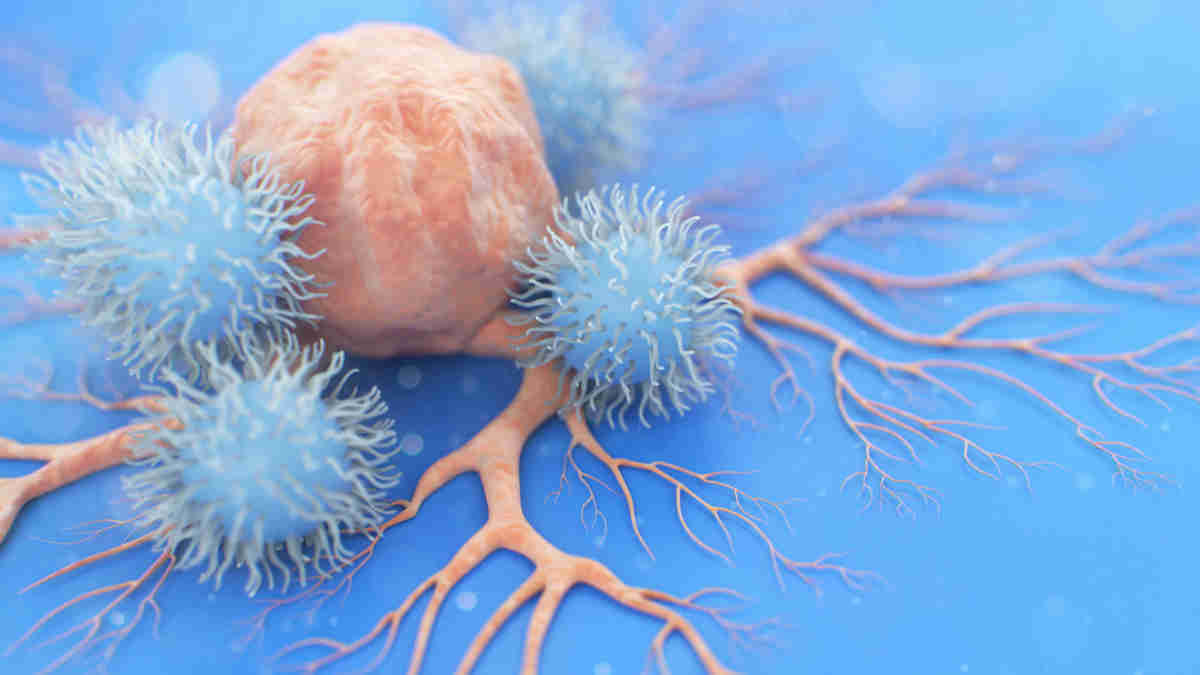Immutep’s clinical trials are advancing rapidly; here are the next catalysts for investors

Immutep’s CEO Marc Voigt gives Stockhead updates on the ongoing trials, and where the next catalysts are. Picture Getty
- Immutep has a number ongoing clinical trials focusing on immuno-oncology
- The trials focus on the company’s lead drug, Efti, which is a soluble LAG-3 protein
- CEO Marc Voigt gives Stockhead updates on the ongoing trials, and where the next catalysts are
Around 20-30 years ago, immunotherapy was thought of as an obscure treatment by the medical community.
But in 2016, the American Society of Clinical Oncology nominated immunotherapy as one of the most significant medical breakthroughs for cancer.
Since then, research on immunotherapies has continued at a swift pace, with hundreds of ongoing clinical trials all over the world.
In February this year, the FDA for the first time approved a cell therapy for solid-tumour cancers – melanoma drug Amtagvi (lifileucel).
On the ASX, things are also moving rapidly in the immuno-oncology space.
Immutep (ASX:IMM) for instance has released a flurry of market updates recently on its novel LAG-3 immunotherapy programs for cancer and autoimmune disease.
Immutep has become one of the global leaders in LAG-3 therapies, and is probably the only LAG-3 pure play with more programs around LAG-3 than anyone else.
The company’s lead asset Eftilagimod Alpha (Efti), a soluble LAG-3 protein, is at the centre of this evolution.
Efti helps the body’s immune system fight cancer. In simple terms, it acts like a “booster” for the immune system, making it stronger and better at recognising and attacking cancer cells.
It works a bit like the general of the immune system, informing the T-cells forces – or the white blood cells – on who to attack.
For more on Efti and Lag-3, read here: Could immunotherapy replace chemo? Here’s one stock that could rise 5x according to broke
Immutep’s programs around Efti are mainly focused on three core indications – non small cell lung cancer, first line head and neck cancer, and metastatic breast cancer.
It also has ongoing clinical trials on soft tissues sarcoma and autoimmune diseases.
“So we have a number of different clinical trials at one time, and that is our philosophy,” Immutep’s CEO, Marc Voigt, told Stockhead.
“We generate the data, we focus on certain core indications, and we fill that clinical pipeline with additional clinical trials to minimise our risk. We try to do all that with financial responsibility.
“For example we have a number of investigator initiated trials where doctors come to us to test Efti in different settings, we don’t provide the funding but we provide Efti for free. That’s basically our philosophy.”
Here’s an update on Immutep’s clinical trials
Over the past month, Immutep has provided key market updates on its various clinical trials.
These trials are being conducted on the back an $80 million cap raise the company did last year, and a more recent €1.6m ($2.6m) R&D tax incentive cash grant from the French Government.
We asked Voigt to give us more colour and what next catalysts will be for each trial.
TACTI-002 and INSIGHT-003 trials in first line non-small cell lung cancer
The TACTI-002 trial is evaluating Efti in combination with Merck & Co’s anti-PD-1 therapy Keytruda (pembrolizumab) as first-line treatment for patients with previously untreated unresectable or metastatic non-small cell lung cancer (NSCLC).
Data from this trial showed excellent initial results with an initial median OS (overall survival) of 35.5 months.
Notably, this result compares favourably to reported historical results. For instance, patients undergoing anti-PD-1 monotherapy had only 16.4 months median OS, while patients on a combination of anti-PD-1/chemotherapy had 15.8-to-23.3-months median OS.
With these encouraging results, Immutep will now move on to the pivotal Phase III, a trial billed as one of the most significant in the company’s journey.
The NSCLC drug market is expected to grow to US$48 billion in 2031, with immune checkpoint inhibitors (ICIs) expected to reach over half those sales.
“We have publicly guided the market to our plans for the clinical trial design for Phase 3,” said Voigt.
“We will raise the curtain on how this super important and crucial registration effort will look like over the following few weeks, so that’s the next catalyst.”
Meanwhile, the INSIGHT-003 clinical trial is an investigator-initiated Phase I trial conducted by the Frankfurt Institute of Clinical Cancer Research IKF.
This trial is evaluating Efti in combination with standard-of-care anti-PD-1 therapy and doublet chemotherapy (carboplatin/pemetrexe).
Results so far have shown that this triple combination achieved a 70.6% overall response rate, compared to 40.8% in previous trials of monotherapies.
The INSIGHT-003 trial has recently been expanded to four sites across Germany.
TACTI-003 in first line head and neck cancer
The TACTI-003 Phase IIB trial is evaluating Efti in combination with Keytruda in First Line Metastatic Head and Neck Squamous Cell Carcinoma patients with negative PD-L1 expression.
“This trial is building on the data from our previous experience in second-line neck cancer, which we released at the ESMO conference last year,” said Voigt. “So there has been some earlier evidence on the drug in a different line of treatment.”
Immutep recently released data from the Phase IIB trial, which showed a preliminary 26.9% response rate from Cohort B, the primary endpoint of the study.
This compares with the 5% response rate when taking Keytruda alone.
“We all know Keytruda is very powerful. It’s a top selling brand but unfortunately it doesn’t always work well. The combination of Efti and Keytruda meanwhile has a response rate of 26.9%, which is a five-fold increase,” said Voigt.
“Our data also shows that the number of patients reacting to stabilisation of disease ie; where you don’t see further tumour growth, was 57.7%. So about 57% of the patients had a positive benefit of the Efti+Keytruda combination treatment.”
“We’re hoping to release the full data release in the first half of this year, so that should happen around the end of June at the latest,” said Voigt.
AIPAC-003 in metastatic breast cancer
The AIPAC-003 is a Phase II/III trial is evaluating Efti in combination with paclitaxel for the treatment of metastatic HER2-neg/low breast cancer (MBC), and triple-negative breast cancer, an aggressive cancer with limited treatment options.
Immutep and the US FDA had previously agreed to the trial design, which also incorporates feedback from scientific advice meetings held with the European Medicines Agency (EMA).
In the latest update, Immutep reported encouraging initial efficacy in six metastatic breast cancer patients. These patients demonstrated a 50% overall response rate, including one complete response, and a 100% disease control rate.
This trial used 90mg of Efti, showing that the drug is safe and well tolerated at that dosage. The previously highest dose of efti ever tested was at 30mg.
“This trial covers about 80% of the metastatic breast cancer types, and we focus on women who have been already pretreated with a best standard of care,” said Voigt.
“For the very first time, we have tested the highest ever tested dose of Efti, which is 90 milligrams.
“In the first six patients, the results have been very encouraging. We need to be careful here because six patients are of course a small number, but the data points in the right direction, and there was also complete response from these patients,” added Voigt.
Immutep has presented more data on these six patients at the ESMO conference held on Wednesday in Berlin. The presentation will be shared with investors in due course.
IMP761 Phase I trial on autoimmune diseases
IMP761 meanwhile is an immunosuppressive LAG-3 agonist antibody, which has the potential to address the root cause of many autoimmune diseases.
The drug works by silencing autoimmune memory T cells that accumulate at disease sites, and restoring balance to the immune system.
Immutep has just entered into an agreement with the Centre for Human Drug Research (CHDR), a world-class institute in Leiden, the Netherlands, specialising in cutting-edge early-stage clinical drug research, to perform this first-in-human clinical study of IMP761.
This Phase I study will enrol approximately 49 healthy volunteers, with the objective of assessing safety, pharmacokinetics (PK) and pharmacodynamics (PD).
The study will use CHDR’s special KLH challenge model, which is great for testing how well new immune-boosting drugs work early on in clinical trials.
“With IMP761, we’re basically switching gears from triggering the immune system to actively fight cancers, to subduing it because it’s been getting out of control and is attacking, for instance, your own organ system,” explained Voigt.
“We designed IMP761 to have an approach which is potentially suitable for more than 90% of autoimmune diseases.
“It’s an approach that goes after the root cause of the disease, which are the chronically LAG-3 activated T cells.”
“We hope to have the first results from this first human trial before end of this year,” said Voigt.
Immutep share price today:
The views, information, or opinions expressed in the interview in this article are solely those of the interviewee and do not represent the views of Stockhead.
Stockhead has not provided, endorsed or otherwise assumed responsibility for any financial product advice contained in this article.
Related Topics

UNLOCK INSIGHTS
Discover the untold stories of emerging ASX stocks.
Daily news and expert analysis, it's free to subscribe.
By proceeding, you confirm you understand that we handle personal information in accordance with our Privacy Policy.








